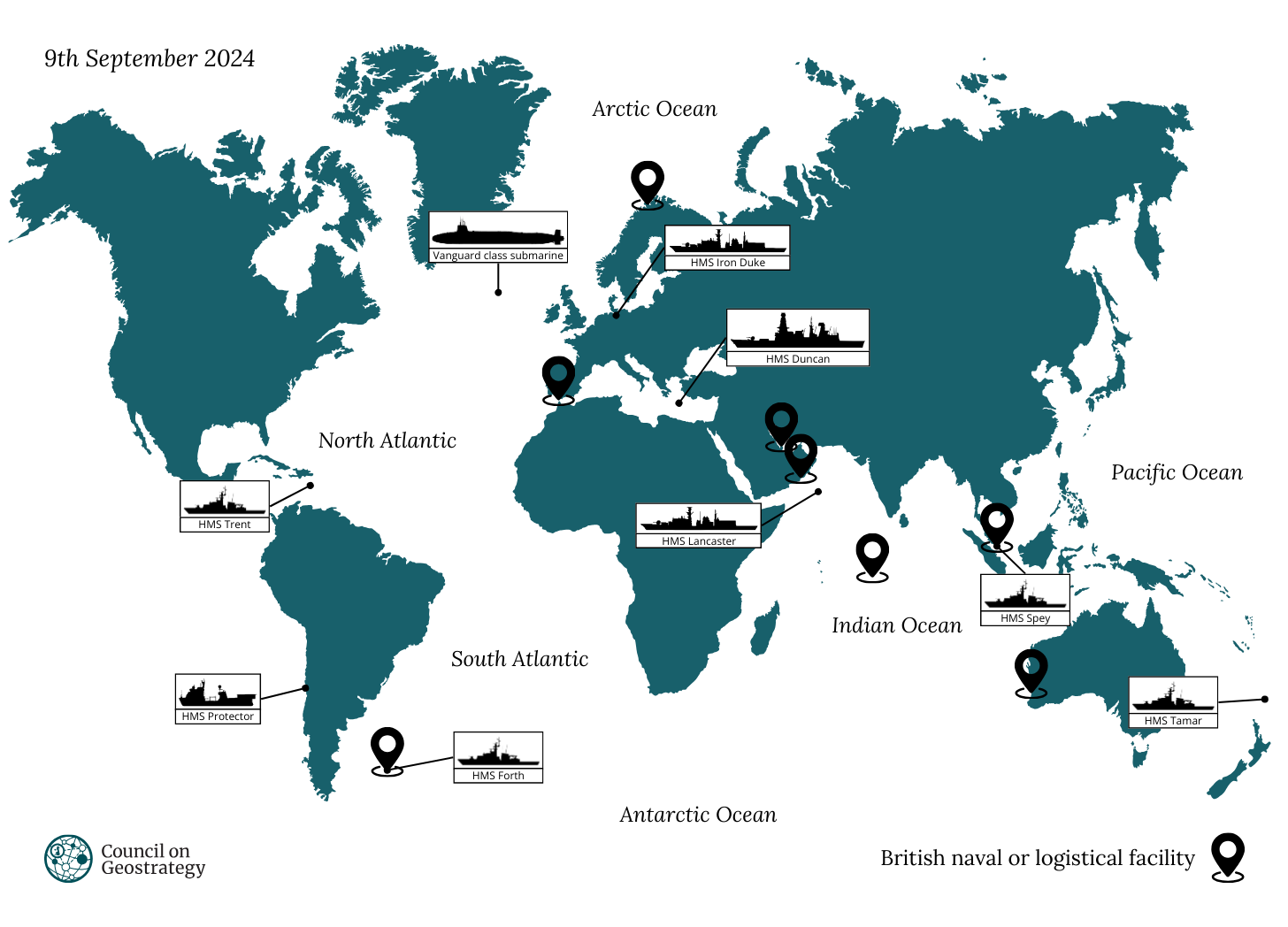
Welcome to the ninth Cable, our weekly roundup of British foreign and defence policy. The Cable is published every Monday at 12:00.
Parliament is back from recess. And last week saw the serious job of legislating begin again in Westminster. It has been a big week for energy security and the green transition in the United Kingdom (UK), as His Majesty’s (HM) Government secured 131 clean energy projects in the latest renewable energy auction – a record-breaking number. The success of this auction – held annually – followed the announcement in July that the new Labour government would add £500 million to the auction budget, bringing the total to over £1.5 billion – a record sum. Once operational, these new projects will have a nameplate capacity of around 9.6 Gigawatts (GW), more than 10% of Britain’s current energy needs. In a statement released after the auction, Ed Miliband, Secretary of State for Energy Security and Net Zero, said: ‘It is another significant step forward in our mission for clean power by 2030 – bringing Britain energy independence and lower bills for good.’
There has been a flurry of activity in the realm of defence, with HM Government pledging further military aid to Ukraine following a meeting in London between John Healey, Secretary of Defence, and Rustem Umerov, his Ukrainian counterpart. On 6th September, the Ministry of Defence (MOD) announced that it will supply Kyiv with 650 Lightweight Multirole Missiles (LLMs) through a £162 million contract to enhance Ukranian air defences. This follows the declaration of a £300 million military aid package by the International Fund for Ukraine (IFU) in July, which will include 120,000 artillery shells. This UK-led initiative has now provided or promised Kyiv more than £1 billion in military supplies since it was set up in late 2022.
In other defence news, on 4th September, Healey boarded the Vanguard class submarine for the final leg of its return journey to HM Naval Base Clyde. During his visit, Healey reinforced the government’s plan to ‘triple lock’ support for the country’s nuclear deterrent. This commitment includes: maintaining the UK’s continuous at sea nuclear deterrent, upgrading naval vessels and facilities and building the next generation of nuclear-powered ballistic missile submarines (SSBNs). In a statement following the visit, Healey said ‘Our new Government is unwavering in our commitment to our nuclear deterrent, maintained on behalf of the UK and our North Atlantic Treaty Organisation (NATO) allies. Our ‘triple-lock’ will safeguard Britain for generations to come.’
How Britain is seen overseas
The Wilson Centre in Washington released an article examining the first forays of the new British government’s policy of ‘resetting’ relations with older European countries. The article states that after the European Political Community (EPC) summit held in Blenheim Palace, there is now a chance to ‘build back better relations’ between the UK-European Union (EU). The author believes that British-EU relations are at a pivotal moment as the move to put aside grievances comes when the countries of Europe are facing intense and shared security challenges in the Euro-Atlantic. It concludes by saying that the UK-led EPC summit helped to foster a sense of European unity in the face of Russian revanchism.
How competitors frame Britain
Sputnik International released a piece of propaganda in which it called Britain the ‘most hostile NATO country’ and the ‘thinking head of the Western Hydra’ for supporting the Ukrainian war effort. The article claims that Britain is directly involved in Ukrainian strikes against Russian energy facilities and that the UK is where Ukrainian specialists who carry out such operations are trained. What an incredibly honourable title for Britain to receive!
The Global Times published an opinion piece stating that the influx of Chinese electric vehicles (EV) into the UK is a positive development for the country. The article calls for Britain not to impose tariffs on Chinese EVs – as the United States (US) and EU have done/are proposing – so that the British public can gain access to cheap cars while also reducing emissions from the transport sector. The article ends ominously, warning Britain ‘not bite the hand that feeds you.’ A chilling reminder that the People’s Republic of China (PRC) seeks to dominate the global market for clean technologies to create dependencies on Chinese suppliers.
Tracking the Royal Navy’s global deployments
Though invisible, the Royal Navy’s ballistic missile nuclear submarine was deterring the gravest threats to British interests from the depths of the North Atlantic last week. Tragic news broke on Wednesday as a helicopter from HMS Queen Elizabeth crashed into the English Channel, leading to the loss of one crew member. HMS Iron Duke is visiting Hamburg in Germany, having shadowed Russian warships in the English Channel. On the other side of the world, HMS Protector visited Valparaíso in Chile to take part in large multinational exercises, while HMS Duncan remains in the Eastern Mediterranean.
In other parts of the world, HMS Lancaster remains East of Suez. Offshore patrol vessels HMS Forth, HMS Trent, HMS Spey and HMS Tamar were busy as ever. HMS Forth patrols waters surrounding the Falkland Islands, HMS Trent stands ready in the Caribbean to provide assistance during hurricane season, HMS Spey undergoes maintenance at the British logistics facility in Singapore (while also providing a stunning backdrop for photos), and HMS Tamar promotes British interests in the South Pacific.
How Britain thinks about foreign affairs
In a July 2022 speech, General Ken McCallum, MI5 Director, declared that ‘the most game-changing challenge we [the UK] face comes from the Chinese Communist Party (CCP)’ stressing that HM Government should make the UK a ‘harder target.’
Acknowledging the systemic threat posed by the CCP, the previous government committed to bolstering national security, fostering cooperation with allies and partners, and maintaining strategic engagement with the PRC. David Lammy, then Shadow Foreign Secretary, reiterated these priorities in 2023, vowing to put national security ‘above all else.’
However, since taking office in July 2024, Labour’s actions are beginning to show signs of turning a blind eye to the more insidious long-term threats posed by the CCP, in exchange for immediate economic gains. HM Government quickly greenlit large solar farms, sweeping under the rug well documented human rights abuses in solar photovoltaic (PV) supply chains. Chinese-built EVs have been welcomed into the UK market, despite major allies warning about market-distorting state subsidies, threats to domestic industry, and the geopolitical risks of PRC dominance in the EV sector. Perhaps most worryingly, the decision to place the PRC on the ‘enhanced tier’ of the Foreign Influence Registration Scheme has been quietly delayed, despite the preparatory work being almost complete. Pro-CCP influence in government, business, and academia will remain invisible, even as policy is pulled in directions which may jeopardise Britain’s long-term strategic interests.
Implications
Balancing economic prosperity, national security, and climate goals in the UK’s relationship with the PRC requires careful calibration, but the UK’s fragmented strategic environment is allowing short-term political and economic pressures to take precedence over long-term national interests. A disjointed approach risks compromising the UK’s strategic autonomy.
Labour’s greatest challenge is not only implementing immediate countermeasures but developing a sustainable, non-partisan ‘China strategy’, elevated to a cabinet-level priority. This strategy should ensure long-term strategic continuity across successive governments, transcending short-term political cycles and partisan divides. The consequences of turning a blind eye to deeper systemic threats will compound over time and erode Britain’s remaining defences to the strategic intent of the CCP. Though the effects may take decades to manifest fully, these will ultimately fall on future governments to address – then, they will be in command over a more vulnerable and weaker target.
If you found this Cable useful, please subscribe or pledge your support!
What do you think about this Cable? Why not leave a comment below?










